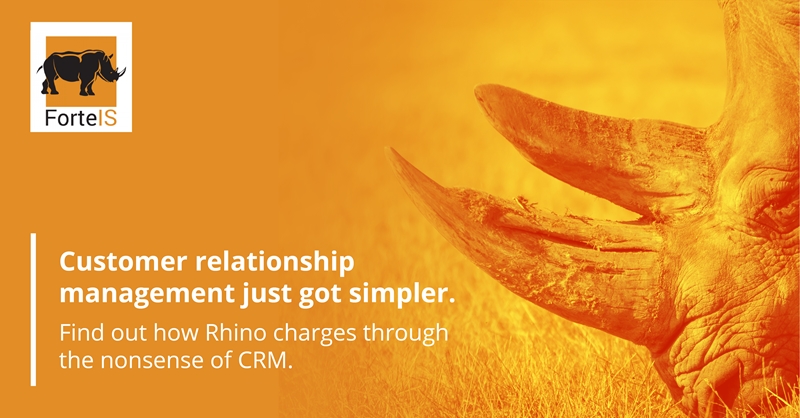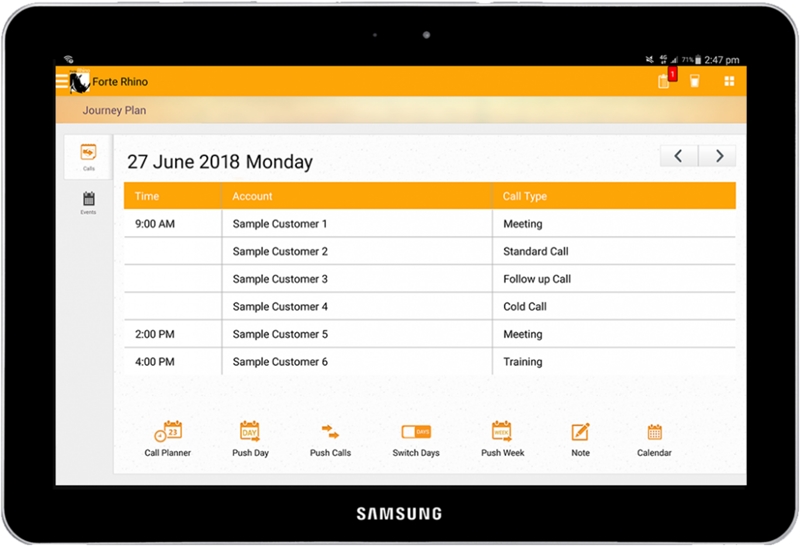5 ways to get organised and increase sales
Improving the productivity of existing sales representatives is considered the most crucial step towards achieving revenue goals, reports Docurated. Despite this, only one-third of a sales rep’s time is actually spent selling to customers – the rest, lost to admin tasks and research. So, it stands to reason that the best way to increase sales, and thereby drive revenue, is to enable sales staff with the right tools to maximise selling time.
In this article, we’ll provide five simple tips to help sales reps get organised and increase sales.
1. Spend less time on admin
Reporting is an important part of effective sales. Good reporting means reps can easily see areas for improvement or accounts needing attention. So it’s expected sales staff should spend some time on reporting, but that doesn’t mean it should eclipse similarly valuable sales time.
This is where a customer relationship management (CRM) system like Rhino comes in. Rhino includes a number of off-the-shelf reports enabling fast, automated reporting so your team can get access to information with ease.
That said, the aforementioned Docurated report also indicated that CRM was a common cause for time loss among sales people. With that in mind, it’s crucial to find a system that’s easy to use, so it supports your sales team without getting in their way. Read our article “7 reasons to adopt a user-friendly CRM system” for more information about the importance of simple, effective CRM.
 Spend less time on admin and reporting with simple CRM features.
Spend less time on admin and reporting with simple CRM features.2. Plan your calls effectively
Research by Pace Productivity shows sales people spend, on average, 6.6 hours per week on the road. That’s about 16.5 per cent of a 40 hour work week. When asked, sales people claimed this was an activity they’d like to spend much less time on – ideally only 3 hours per week.
There’s only so much that can be done to reduce travel times, of course – no one can dictate how far away a client is based, or what traffic may be like on any given day. But it is possible to strategise for less travel distances in any given day by ensuring trips are organised smartly. Journey Planning is a core feature of the Rhino CRM, helping sales people plan which accounts to call on in similar areas to maximise time better spent selling. With an emphasis on usability, Rhino is designed to make Journey Planning quick, painless and effective.
3. Stop trying to multitask
Multitasking is an enticing idea. If you can do two things at once, that could hardly be a bad thing, right?
Think again. A study published in the Journal of Experimental Psychology suggests that multi-tasking can cost as much as 40 per cent of someone’s productive time. This is because the mental process of repeatedly switching contexts can quickly become overwhelming, producing mental blocks and making it harder to complete any task to as high as standard as you might otherwise. Giving your brain only one task to focus on at a time means you’re less likely to struggle with mental blocks and more likely to work to a higher standard.
 Constantly interrupted? Blocking out dedicated inbox-time can reduce the urge to multitask.
Constantly interrupted? Blocking out dedicated inbox-time can reduce the urge to multitask.4. Say no to email traps
Along the same lines, we’ve all been in a situation where one email can destroy hours of focus.
A poorly timed email notification can have a similar effect to multi-tasking, pulling your brain into a different context and thereby interrupting valuable flow. One solution to this is to eliminate the possibility of distraction with regular, appointed email time blocks. Turn off email notifications and establish blocks of time in the day – half an hour in the morning and again in the afternoon, for example.
In these time blocks, start by addressing any emails you can take immediate action on – for example, items you know you can simply delete or forward. This immediately removes clutter and helps you understand how much time you can afford to give to each email that needs your attention.
Of course, it’s important to be available to your clients, so it’s a good idea to use an automated response to let them know when they can expect or response, or how to contact you if the matter is urgent.
5. Keep everything in one place
Finally, stop wasting time scrambling for information.
CRM is focused on making every point of contact with a client meaningful. When a sales rep demonstrates a deeper understanding of a client’s business and it’s pain points, it strengthens relationships and improves trust. To do this, a sales person needs access to up-to-date information including transactions and call notes quickly and easily.
Keeping valuable customer data across disparate spreadsheets creates silos and negatively impacts any sales rep’s ability to prepare for calls quickly and effectively. Instead, a user-friendly CRM system like Rhino can create a centralised repository of customer information so sales staff always have the data they need at hand.
Getting organised is simple with the right technology on your side. To learn just what Rhino can do for your team’s productivity, request a free demo today.







 Held back by spreadsheets, your sales people lose valuable time.
Held back by spreadsheets, your sales people lose valuable time. Freedom from spreadsheets means your salespeople can focus on meeting quotas.
Freedom from spreadsheets means your salespeople can focus on meeting quotas. Start having better sales meetings with CRM.
Start having better sales meetings with CRM.
